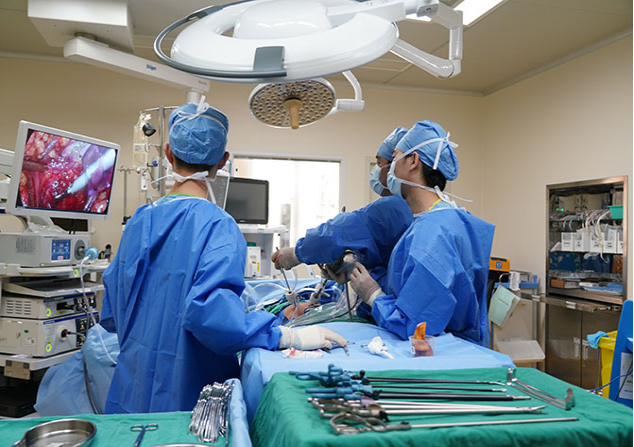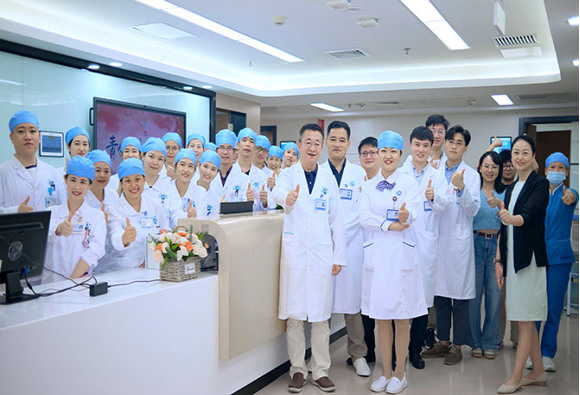

On March 23, a 31-year-old postoperative patient of bone marrow transplantation named Xiao Mei (alias) successfully underwent a living-related donor kidney transplant operation at the Department of Renal Tranplantation, Guangdong Provincial People’s Hospital due to Stage V chronic kidney disease. In particular, the donor of Xiao Mei’s two transplants was her father. Five years ago, Xiao Mei suffered from acute leukemia, and her father donated bone marrow for hematopoietic stem cell transplantation. Three years ago, after Xiao Mei had undergone regular weekly dialysis for many years due to an increase in creatinine, his father learned from the Department of Nephrology, Guangdong Provincial People’s Hospital that the long-term need for blood dialysis could be eliminated by kidney transplantation surgery, so she went to Prof. Sun Qiquan’s outpatient service in the Department of Renal Tranplantation. Learning that her father donated bone marrow to her five years ago, and based on her medical history, Prof. Sun suggested that they undergo living donor kidney transplantation, which would not only free them from the torture of waiting for donors, but also eliminate the need for postoperative long-term immunosuppressant administration, and reduce postoperative complications greatly.
Since their visit, Prof. Sun has tailored diagnostic and therapeutic schemes to them in every detail. Before the operation, he developed an immune induction scheme through discussion with domestic and overseas immunologists to minimize postoperative adverse reactions. On March 23, a living-related donor kidney transplant operation was performed on Xiao Mei and her father successfully, who showed good postoperative recovery. On the third day after the operation, her father could move about and recovered quickly, while her creatinine dropped from the preoperative level of 998mmol/L to below 100mmol/L, and her daily urine output was back to normal quickly. An immunosuppressant was used at a small dose only during the perioperative period, and medication would be fully discontinued one month after the operation, avoiding the trouble of postoperative long-term administration of anti-rejection drugs. His father also recovered quickly and was discharged one week after the operation.

According to literature search, this case of sequential hematopoietic stem cell and kidney transplantation with induced natural immune tolerance is the first of its kind in China (excluding clinical trials), and this type of homologous sequential transplantation has great potential in correcting hematopoietic and immune deficiency disorders, and inducing tolerance in allogeneic kidney transplantation, and can tolerate chronic and acute rejections between allogeneic transplants effectively; immune tolerance is generated for the donor’s own antigens only, while normal immune responses can be generated for other antigens, so there is no risk of secondary infection arising from immune dysfunction.
It is learned that there are nearly 900,000 uremic dialysis patients nationwide, with an average dialysis length of less than five years, and dialysis complications are always threatening their lives; moreover, dialysis is expensive, and demanding for one’s own blood vessels; patients have to receive dialysis regularly, which affects their quality of life seriously through time and travel constraints. Kidney transplantation is the only way for end-stage kidney disease patients to return to a normal life. However, for many reasons, such as the shortage of donors and varying quality levels of donor kidneys, living-related donor kidney transplantation has become another path of organ transplantation. Living donor kidney transplantation not only ensures the quality of life of the donor, but also gives a second life to the recipient! In recent years, Guangdong Provincial People’s Hospital has taken the lead in carrying out living-related donor kidney transplantation, and ranked first in our province in 2022 in terms of the number of living-related donor kidney transplant operations.

Living-related donor kidney transplantation has the following advantages: 1) ensuring the donor’s quality of life through accurate evaluation; 2) avoiding prolonged waiting; 3) multiple matching sites, low incidence of rejections, and low immunosuppressant doses; 4) ensuring good donor kidney quality, and significantly reducing warm and cold ischemia times; 5) better postoperative short- and long-term efficacy than that of cadaveric donor kidneys; 6) small traumata and fast recovery for the donor due to a minimally invasive operation; 7) enhancing family relationships; and 8) low costs. Led by Prof. Sun, the Department of Renal Tranplantation, Guangdong Provincial People’s Hospital, is one of the first units qualified for kidney transplantation in China, a key clinical department in Guangdong Province, and an excellent clinical department of Guangdong Provincial People’s Hospital, and has performed over 1,000 kidney transplant operations.
In order to reduce the financial burden on families undergoing live-related donor kidney transplantation and boost health recovery, the Department of Renal Tranplantation, Guangdong Provincial People’s Hospital has launched the Relative Kidney Transplantation Support Program under the strong support of our hospital, which provides a one-time gratuitous monetary subsidy of 20,000 yuan for expenses related to nephrectomy to each kidney donor, almost covering all hospitalization expenses of a kidney donor during hospitalization! Living-related donor kidney transplantation brings the hope of survival to all patients.
It is often said that a father's love is as great as a mountain, but for Xiao Mei, her father’s love is even as great as a sea of mountains! Hematopoietic stem cell transplantation has given Xiao Mei an unyielding spine like a mountain, while kidney transplantation has given her a profound power like a sea. Xiao Mei carries the three lives given by her father, and her life has thus become stronger!
Department of Renal Tranplantation
Updated: April 27, 2023